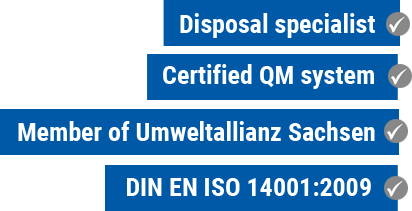
GMR - Gesellschaft für Metallrecycling mbH
We are experts in environmentally compatible disposal & recycling of amalgam, mercury and button cells
The company's purpose is environmentally compatible recycling of old mercury and mercury-containing wastes of all kinds, with the target of recovering the mercury contained in the wastes as a raw material, cleaning it and returning it to economic circulation as mercury of highest purity. With its many years of experience, GMR Gesellschaft für Metallrecycling mbH is in high demand as a partner in this industry.
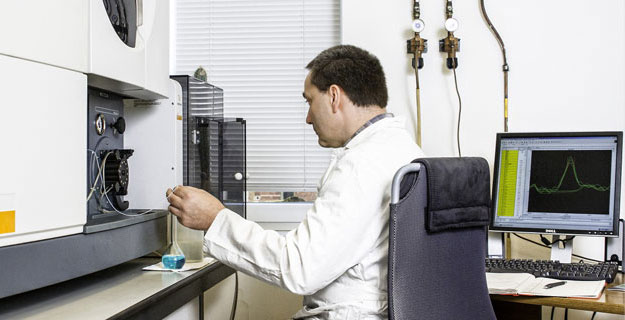
Our certifications:
- Disposal specialist, exempt purs. to § 56 KrWG and § 2 para. 1 EfbV
- Certified QM system purs. to DIN EN ISO 9001:2008
- Certified UM system purs. to DIN EN ISO 14001:2009
- Certified SGU management system with standard SCC*
GMR Gesellschaft für Metallrecycling mbH was founded in 1991. The company employs 18 persons and is active around the world today.
The company successfully operates vacuo-thermal treatment and immobilisation of mercury-containing sludges and residues with natural radioactivity and production of precious metal concentrates of stainless steel wastes and residues in addition to treatment of traditional mercury-containing wastes.
The company has 6 BlmSchG-approved vacuum recycling systems with differently sized useful spaces at its sites in Leipzig and Espenhain, including the largest vacuum recycling system in the world with a useful space of 3 cbm.
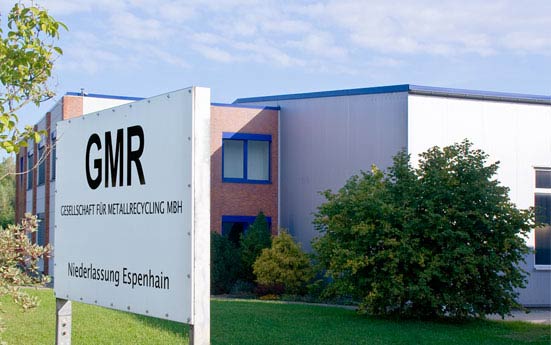
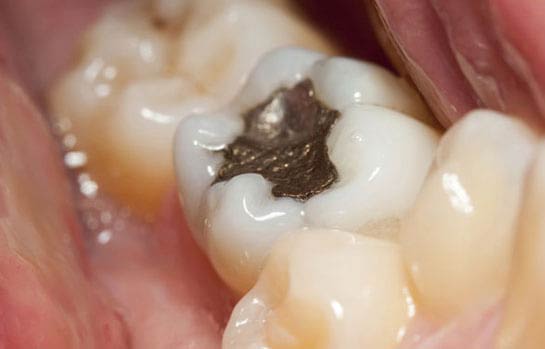
Production of precious metal from amalgam sludges and residues
Precious-metal-containing wastes regularly arise in dental medicine. Direct recovery of the precious metals is not possible, since these wares contain not only the precious metals, but also poisonous mercury. The mercury must be removed before delivery to a cutting facility. GMR Gesellschaft für Metallrecycling mbH will gladly take care of this for you.
The wastes include amalgam residues, which occur at dentists' practices in the form of separator residues or stirring residues (also excess amalgam). Teeth with amalgam fillings are part of this as well. Due to their valuable content, these residues are usually collected from the dentists by specialist companies, pre-treated (e.g. disinfected and dried) and then delivered to GMR.
Professional and economically efficient use of amalgam
GMR de-mercurises the delivered amalgam sludges and residues in various vacuum distillation systems at concurrent recovery of the mercury contained. The precious metal concentrates that remain after treatment are virtually free of mercury and are either returned to the customer or, at the customer's wish, passed on to a precious metal separating facility of his choice. GMR can purchase the precious metals at any time. In addition to professional use of amalgam, we also take care of the disposal of capsules, screens and separators.
You would like to know about our professional utilisation of amalgam?
We will be pleased to provide you with further information and to answer all your questions by phone +49 (0) 341 / 4972000 or via our contact form!
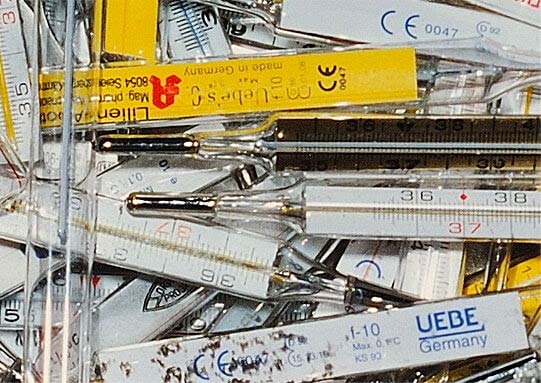
Professional mercury recycling – Production of pure and highly pure mercury
GMR has mastered environmentally compatible recycling of old mercury from mercury-containing wastes of all kind. The bandwidth ranges from traditional fever thermometers to relays, rectifiers, tooth amalgam and button cells up to industrial residues.
The distillation systems work in batch operation. The mercury in the wastes is recovered by quantity, treated in a multiple-stage cleaning process in the company's in-house facility until mercury of the highest purity (highly pure mercury up to 7N) results and is then provided to the European economic cycle again as a raw material.
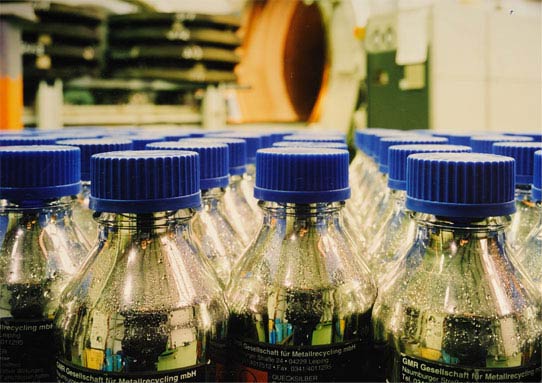
Technical background
The mercury is removed from the wastes at temperatures between 350 – 700 °C and pressures of 0.01 – 700 mbar and then recovered by low-temperature condensation. Organic shares are thermally oxidised by air or oxygen addition in an after-burning chamber at temperatures of 800 – 1000 °C if necessary.
The residues remaining after vacuo-thermal treatment are virtually free of mercury and supplied to further use or safe disposal depending on their contents.
Due to its many years of experience, GMR Gesellschaft für Metallrecycling mbH is a recognised and popular partner for the disposal of mercury.
You would like to find out more about our professional utilisation of mercury?
We will be pleased to provide you with further information and to answer all your questions by phone +49 (0) 341 / 4972000 or via our contact form!
Safe treatment from product input to product output
Handling of mercury-containing NORM residues is hazardous to health and to the environment and must be approved by the relevant supervisory authorities. GMR has developed a technology that ensures dust-free treatment of such materials from the product input to the product output. Our facility works in batch operation and permits a throughput of up to 3 tons per day.
Our company is a popular partner of the crude oil/natural gas industry for professional recycling of the mercury-containing residues that arise in this area. These usually are sludges from cleaning of plants/plant parts or residues that arise when cleaning the pipes (scales). Some of these residues are NORM residues (Naturally Occurring Radioactive Material), i.e. they contain natural radionuclides.
Technical background
De-mercurisation (removal of the mercury) takes place in a vacuum-tight double-walled heating mixer. The heating medium used is thermal oil. A highly efficient vapour precipitator is used for dust separation. Fractioned distillation permits separate recovery of water and the hazardous substance fraction. The radionuclides quantity remains in the mineral residue. The liquid fraction is free of radionuclides.
For permanent stabilisation of the radionuclides in the mineral residue, it is mixed with a special cement (geopolymer) in a special procedure. After the corresponding curing time and release by the relevant authority, the immobilised geopolymer products can be stored in an above-ground landfill, since there is no destruction by erosion and no elution of hazardous substances.
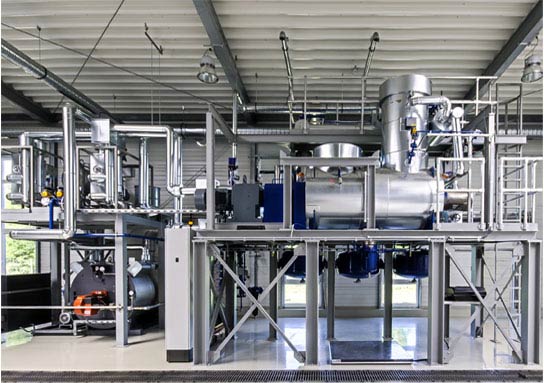
You would like to know about our professional treatment of NORM residues?
We will be pleased to provide you with further information and to answer all your questions by phone +49 (0) 341 / 4972000 or via our contact form!
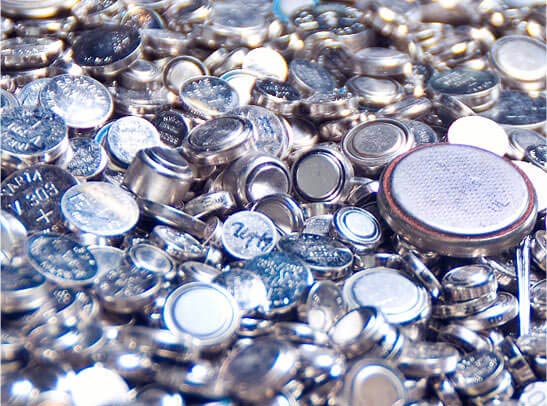
Battery recycling – sorting and treatment of button cells
If you are looking for an option for professional recycling of button cells, you have come to the right place. As a disposal and recycling specialist, we are your number 1 contact in Germany, especially for button cells recycling. Contact us now if you want to dispose of used-up button cells of any kind environmentally compatibly. We will make you a good offer.
Technical background information
About 43,500 t device batteries are marketed in Germany every year. 18,100 t old batteries were collected again in 2012. The different battery systems are separated in sorting systems, with the smallest fraction (approx. 150 t per year) arising in the form of a button cell mix.
The mix essentially consists of the systems lithium/manganese (Hg-free) and alkali/manganese, zinc/air, silver/zinc (all Hg-containing).
Depending on system, the button cells will contain valuable substances such as silver, zinc, steel, etc. as well as environmentally hazardous substances. Sorting by size makes it possible to fully separate lithium/manganese button cells, remove contaminations and concentrate other systems.
The value creation process happens when the share of silver/zinc button cells is as high as possible in one fraction, or entirely removed from the other fraction. The mercury-containing button cells are treated in our vacuo-thermal systems at up to 800 °C. The baked-out batteries are then separated into the steel share and battery powder by a shredder process. The powder is processed on silver.
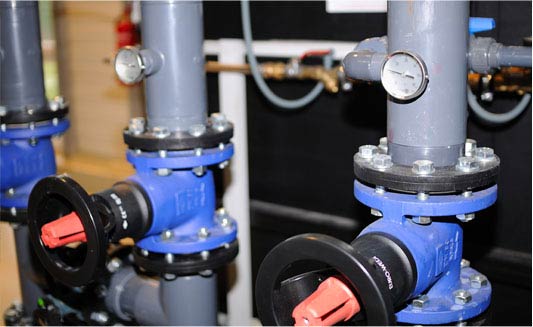
You would like to know about our professional use or disposal?
We will be pleased to provide you with further information and to answer all your questions by phone +49 (0) 341 / 4972000 or via our contact form!

For your questions, please use the following form.
![]()
GMR Gesellschaft für Metallrecycling mbH
Naumburger Str. 24
DE-04229 Leipzig
![]()
Business hours
Monday - Friday:
07:00 Uhr - 15:00 Uhr
![]()
Phone
+49 (0)341 - 4972000
![]()
Mail:
info@gmr-leipzig.de
GMR Gesellschaft für Metallrecycling mbH
